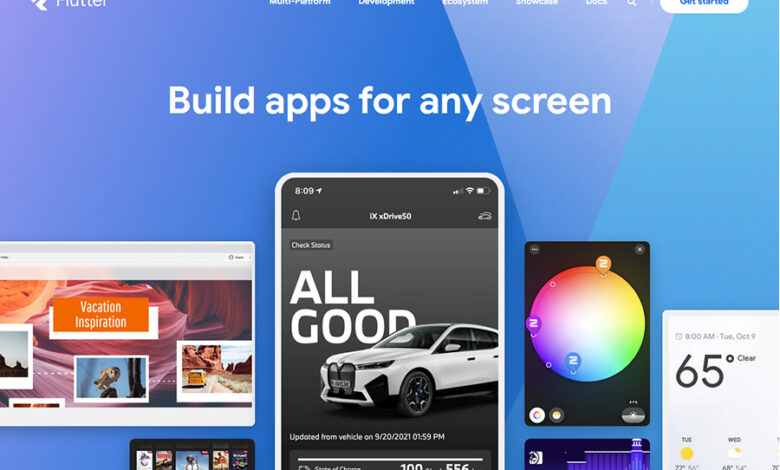Flutter Advantages and Disadvantages

Flutter Advantages and Disadvantages
Flutter is a user interface software development kit (SDK) provided by Google that enables developers to build cross-platform apps for mobile, web, and desktop. It was officially released in 2017.
Flutter is today one of the most popular toolkits for mobile app development, but is it the right choice for you? Read on to learn more about this platform and explore its pros and cons.
Flutter Advantages
 Flutter was developed to help teams create apps across platforms from a single code base in a fast and simple way. Many have seen it as Google’s answer to Facebook’s React framework. Let’s review Flutter’s key strengths.
Flutter was developed to help teams create apps across platforms from a single code base in a fast and simple way. Many have seen it as Google’s answer to Facebook’s React framework. Let’s review Flutter’s key strengths.
- Accelerates Development – Flutter speeds up development by helping developers avoid repetitive tasks, build multiple apps from the same code, and test apps faster. It was built for speed, and for many users, it’s one of its most attractive features.
- Good Performance – Apps built with this toolkit look and run smoothly on Android and iOS. Developers don’t have to compromise on quality when they use this platform.
- Hot Reload – Flutter allows for fast changes of code which can be viewed in real-time, a major time saver for developers looking to maximize their productivity.
- Widgets – The toolkit enables users to build user interfaces (UI) using readily available widgets, or by creating their own custom widgets. Widgets are easy to use and offer developers a simple way to implement different features into an app.
- Cost-Effective – Flutter is open-source and benefits from support from Google, which makes it a reliable and cost-effective choice for developers looking for more than a temporary solution.
- Robust Code Structure – With Flutter it’s easy to build all the functionality you want into a mobile app while having access to all the tools that developers need in one place.
- Great for Startups – Flutter is great for startups who need a Minimum Viable Product (MVP) of their app to show investors and attract the attention of other backers. It makes creating an MVP a lot simpler and more cost-effective than other cross-platform mobile development frameworks.
Flutter Disadvantages
 Knowing Flutter’s weak points and limitations is important before embarking on an app development project that relies on this platform. Here are the big ones.
Knowing Flutter’s weak points and limitations is important before embarking on an app development project that relies on this platform. Here are the big ones.
- Reliance on Dart – Flutter uses the Dart programming language, which is unique to this platform. While Dart is in many ways an accessible and productive language, the fact that developers have to learn it to use the platform to its full capabilities is a drawback for some, especially since Dart is still a relatively new language.
- Not Yet Mature – One of the newer kids on the block, Flutter has a more limited code library compared to more established frameworks despite its rapid adoption rate.
- App Size – Apps created with this software development kit tend to be larger than those built with other frameworks, which can be a drawback for certain types of apps, such as progressive web apps or those designed to be used on low-end devices.
- Fewer UI Kits – Creating a sophisticated app UI with Flutter at this point is not always an easy process because there are not yet all that many external UI kits around.
- Non-Native Feel – Apps built with this kit don’t always look 100% like native apps. This isn’t always a problem but something to keep in mind.
Flutter Advantages and Disadvantages – Summary
Flutter is a convenient choice for cross-platform app development projects that need to be completed quickly and affordably. Features like quick coding, Hot Reload, and widgets make it very intuitive.
While it does require a knowledge of Dart and has a number of limitations, Flutter is a mainstream choice especially appealing for small and medium-sized app development. As the platform matures, its adoption will likely only continue to grow. For many developers then it can prove a good long-term choice.
Flutter Advantages and Disadvantages – Advantages
- Accelerates Development
- Good Performance
- Hot Reload
- Widgets
- Cost-Effective
- Robust Code Structure
- Great for Startups
Flutter Advantages and Disadvantages – Disadvantages
- Reliance on Dart
- Not Yet Mature
- App Size
- Fewer UI Kits
- Non-Native Feel
Additional Flutter Resources

- Flutter Dev – Flutter is supported and used by Google, trusted by well-known brands around the world, and maintained by a community of global developers.
- Flutter Samples – A curated list of Flutter samples and apps
- Flutter Cookbook – contains recipes that demonstrate how to solve common problems while writing Flutter apps.
- Flutter Learning – Choose your skill level to start your journey from resources through learning activities.
- Flutter Latest News -latest articles on Flutter Development
